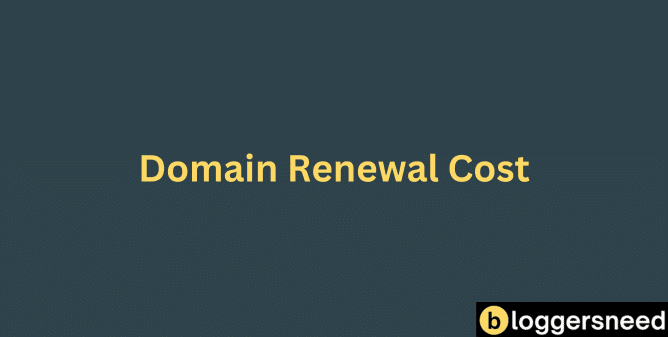
When renewing a domain name, the cost typically ranges from $9 to $30 per year, with specific renewal fees varying based on the registrar and top-level domain (TLD). Premium domains tend to be pricier due to demand and uniqueness.
For instance, popular TLDs like .com, .net, and .org usually have renewal prices between $8.27 and $29.99 per year, depending on the registrar. Namecheap, for example, offers a renewal price of $13.98 for .com and $14.98 for .net and .org.
Some registrars, like GoDaddy, offer competitive pricing, charging $12 a year for these TLDs. However, other registrars like HostGator and Domain.com can charge higher renewal prices, such as $19.99 for .com and .net domains.
To minimize costs, you can register for multiple years upfront, utilize cost-effective registrars, and keep an eye on promotions.
If you miss the renewal window, your domain may become publicly available, leading to potential losses in branding and search engine rankings. Missing the renewal date can also result in additional fees for recovery during grace and redemption periods.
Table of Contents
What Is Domain Renewal?
Domain renewal is the process of extending the registration period for your domain name, ensuring your website remains active and under your control past its initial expiration date. This process is vital as your domain name will initially only remain valid for the period you registered it for, which typically ranges from one to ten years.
Once this period expires, the domain name will go back on the market, and anyone can purchase it. To maintain control and prevent competitors from taking your online presence, you can set the auto-renewal feature or renew it manually through your domain registrar to avoid any lapse in your domain ownership.
How Do You Renew Your Domain Name?
You can renew your domain name either manually or automatically through your domain registrar.
Manually renewing your domain involves several steps.
- Login to the Domain Dashboard: Access your domain registrar’s account management platform.
- Select the Domain: Identify and select the domain you want to renew.
- Choose the Renewal Period: Select the number of years you want to renew your domain for.
- Complete Payment: Update your payment information if necessary and complete the renewal purchase.
This manual process ensures your domain remains active without any interruptions.
For automatic renewal, the registrar automatically charges your registered payment method before the domain name expires, guaranteeing continuous uptime for your website.
This feature is usually enabled by default but can be managed as needed.
What Are the Average Costs of Domain Renewal?
The average cost of renewing a domain name varies between $9 and $30 per year, depending on the domain registrar chosen.
For example .com domain renewals cost $13.98 per year at Namecheap, $17.99 at GoDaddy, and $19.99 at Domain.com.
Standard domains typically range between $9 and $30, but certain registrars charge differently for special Top Level Domains (TLDs).
Specifically, less common TLDs like .xyz can cost around $15 for renewals.
Premium domains, prized for their unique names, often have significantly higher renewal costs, sometimes reaching hundreds of dollars per year.
It’s essential to understand these variations to make informed and cost-effective domain registration decisions.
What Factors Influence Renewal Costs?
Multiple factors significantly impact the renewal costs of your domain name. The primary one is the domain registrar you choose, as different registrars offer varying prices with some providing introductory discounts while others charge more upfront.
For instance, the renewal cost of a .com domain can range from $10 to $20 per year, with some registrars offering discounts for multi-year renewals.
Another crucial factor is the time period for which you renew your domain. Longer or shorter terms can influence the overall price, with registrars offering discounts for long-term contracts. For example, registering a domain for multiple years can reduce the average yearly cost.
Furthermore, the type of domain itself plays a key role. Premium domains, which are in high demand or have unique features, cost more to renew. These domains are deemed valuable due to their keywords, short length, memorability, and high traffic potential.
Why Are Domain Name Renewals So Expensive?
Domain name renewals can be expensive due to the cumulative costs of compulsory fees paid to organizations like ICANN and TLD operators, as well as additional services offered by registrars.
ICANN charges registrars a contract fee of over $100,000 to become accredited, and TLD operators like Verisign charge registrars a base fee per domain, such as $6 for .com domains. These fees are then passed on to the domain owner, along with the registrar’s operating expenses and profit margin.
Many registrars use domain sales as a loss leader, sacrificing profit on domains to upsell additional services like hosting, SEO, and e-commerce. This can encourage customers to seek better value from alternative registrars, such as Namecheap, which offers discounted renewal rates.
Furthermore, some high-demand domains, like those that are short, memorable, or contain popular keywords, may carry higher renewal costs.
Transferring domains between registrars can also be complex, sometimes involving paperwork and phone calls, which can make the renewal process more expensive and inconvenient.
What Strategies Can Help Save on Domain Renewal?
To save on domain renewal, multiple strategies can be employed.
Registering your domain for multiple years upfront can help protect against price hikes and lead to significant savings. For instance, some domain registrars like Namecheap offer lower prices for long-term registrations, with the maximum registration period being ten years.
Another strategy is to switch to a more affordable domain registrar. For example, Namesilo and Dynadot offer .com domain names for only $8.99, including features like who.is and support.
Additionally, keep an eye out for promotional deals and discounts, especially from smaller providers. Many registrars run special offers, especially for new customers.
Prioritizing which domains are essential to your business can also help save money. If you have domains that are no longer needed or used, letting them expire can be a cost-effective solution.
What Are the Consequences of Not Renewing on Time?
The consequences of not renewing your domain name on time include loss of website functionality, potential loss of search engine rankings, and the possibility that competitors may acquire the domain if it has significant value for their business.
If a domain isn’t renewed promptly, it enters a grace period, where it can be renewed with additional fees, followed by a redemption period if the grace period lapses, during which renewal is possible but at higher costs.
For example, if a business fails to renew its domain name, customers will experience difficulty accessing the website, potentially leading to a customer service nightmare and financial losses due to inaccessibility.
Moreover, an expired domain can result in loss of brand reputation if competitors gain control of it or impersonate the original business using associated email addresses.
What Are the Common Questions and Answers Regarding Domain Renewal?
Once your domain name is registered, several essential questions come up regarding its renewal.
In this section, we’ll explore these questions and provide detailed answers to help you maintain control over your domain.
Can I Renew My Domain Name With Another Provider?
Yes, you can switch to a new domain registrar when renewing your domain name. This involves some key considerations to ensure a smooth transition.
Preventing any domain-related services (like email hosting) from expiring is crucial, as these services can be affected by the transfer.
Guaranteeing your domain’s accessibility is vital, and this can be achieved by obtaining the EPP (Extensible Provisioning Protocol) or UDAI token from your current registrar.
Most registrars offer free or low-fee transfer services to facilitate this process.
Can I Renew My Domain Name After It Expires?
Yes, you can. Most domain registrars offer a grace period, typically 30 days, during which you can still renew your domain without additional penalties.
For instance, if you have a .com domain, you’ll have 30 days after expiration to restore it at the standard rate. Beyond this period, restoration fees may apply, and the domain may eventually become available for others to register.
What Happens if I Forget to Renew?
If you forget to renew your domain name, it will enter a grace period during which you may still recover it, albeit with possible additional fees. Eventually, it will become available for others to register.
The grace period typically lasts for 30 days, and renewal costs will vary. Check with your domain registrar for specific fees and timing.
Can I Transfer My Domain After It Has Expired?
After your domain has expired, you can’t directly transfer it to a different registrar because its status will have changed to “Registrar-Hold” and can only be transferred if it’s in an “Active” state. To initiate a transfer, you must first renew the domain with your current registrar to change its status back to “Active.”
Are There Any Hidden Costs Associated With Domain Ownership?
When managing your domain, it’s crucial to be aware of any additional fees beyond the initial registration or renewal costs to ensure you’re prepared for all expenses.
Renewal prices vary by registrar and TLD, and you may incur fees for domain privacy (typically up to $10 per year per domain), transfer (ranging from $5 to $100), or domain name server (DNS) management.
Additionally, some registrars might charge for domain renewal or redemption. For instance, GoDaddy charges an annual fee and a small ICANN fee, while premium domains can range from three-figure to seven-figure numbers.
Staying informed and aware of these additional costs will help you budget more effectively.
Affiliate Disclosure: Some of the links in this post are affiliate links, which means I may earn a small commission if you make a purchase through those links. This comes at no extra cost to you. Thank you for your support!
